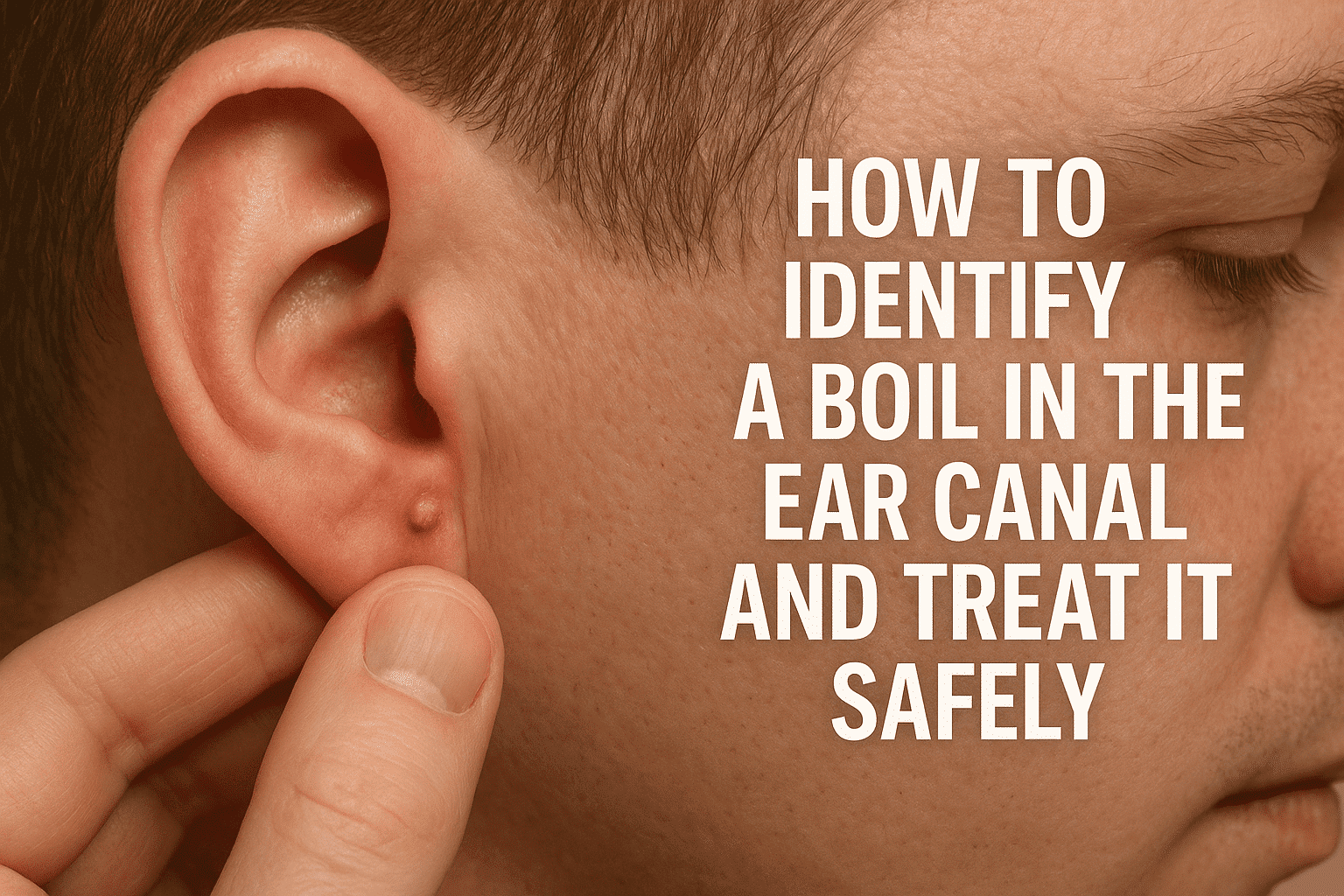Table of Contents
Ear health is often overlooked until discomfort or pain arises. One condition that can cause sudden ear pain is a boil in the ear canal, also referred to as a canal boil, ear abscess, or ear pus boil. These painful lumps may indicate an underlying infection that requires careful attention. Understanding how to identify a boil, recognize its symptoms, and treat it safely is crucial for maintaining ear health and preventing complications.
This guide provides detailed information about ear canal boils, their causes, treatment options, and when to seek professional help.
What Is a Boil in the Ear Canal?
A boil in the ear canal is a localized infection of a hair follicle or sebaceous gland inside the ear. It usually appears as a painful ear lump, often filled with pus, and can cause swelling, redness, and tenderness. In some cases, the infection may lead to temporary hearing difficulties if it blocks the ear canal.
A boil can develop due to bacterial infections, skin irritation, or underlying ear conditions, and it is sometimes linked to more general ear infections.
Common Symptoms of a Canal Boil
Identifying a boil in the ear canal early is important for proper treatment. Common symptoms include:
- Painful ear lump – Tenderness or throbbing inside the ear.
- Redness and swelling – The area around the boil may appear inflamed.
- Ear pus boil – A small collection of pus may form at the tip of the boil.
- Ear discharge – Fluid or pus may leak from the affected area.
- Itching or irritation – The surrounding skin may feel itchy or irritated.
- Hearing changes – Temporary muffled hearing if the boil blocks the ear canal.
- Fever or general malaise – In severe infections, you may experience fever or fatigue.
If you notice these symptoms, it’s essential to monitor the condition and avoid self-treatment that may worsen the infection.
Causes of Boils in the Ear Canal
Several factors can contribute to the development of a canal boil or ear abscess:
- Bacterial infection – The most common cause, often due to Staphylococcus aureus bacteria entering hair follicles.
- Excess moisture – Swimming, sweating, or humid conditions can create a breeding ground for bacteria.
- Ear trauma – Inserting cotton swabs, hairpins, or fingernails into the ear can irritate the skin and lead to infection.
- Skin conditions – Eczema, dermatitis, or fungal infections can increase susceptibility.
- Compromised immunity – Individuals with weakened immune systems may be more prone to boils.
How to Diagnose a Boil in the Ear
Proper diagnosis ensures safe and effective treatment. A healthcare provider may perform:
- Visual examination – Inspecting the ear canal for redness, swelling, or pus.
- Medical history review – Understanding past ear infections or skin conditions.
- Hearing tests – Tests such as pure tone audiometry or tympanometry may be conducted to assess whether the boil is affecting hearing.
- Lab tests – In severe cases, a sample of the pus may be analyzed to identify the bacterial strain.
Early diagnosis helps prevent complications such as chronic infection or hearing impairment.
Safe Treatment Options for Ear Canal Boils
Treating a canal boil safely involves managing pain, reducing infection, and promoting healing. Common treatment approaches include:
1. Warm Compresses
Applying a clean, warm compress to the outer ear several times a day can help reduce swelling and encourage the boil to drain naturally.
2. Topical Antibiotics
For mild infections, healthcare providers may prescribe antibiotic ointments to apply directly to the affected area.
3. Oral Antibiotics
If the infection is more severe or spreading, oral antibiotics may be necessary to combat the bacteria.
4. Professional Drainage
In some cases, a doctor may need to drain the ear pus boil in a sterile environment to prevent complications.
5. Pain Management
Over-the-counter pain relievers can reduce discomfort and inflammation. Avoid inserting objects into the ear, as this can worsen the infection.
6. Preventing Recurrence
Maintaining ear hygiene, avoiding excessive moisture, and treating underlying skin conditions can reduce the risk of future boils.
When to See a Doctor
Immediate medical attention is necessary if you experience:
- Persistent pain or swelling
- Fever or chills
- Spreading redness around the ear
- Recurring boils or chronic ear infections
- Hearing loss or muffled hearing
Seeking a professional ensures that the infection is treated safely and reduces the risk of long-term complications. Clinics like The Hearing Centre offer comprehensive evaluations and treatments, including advanced ear care services and hearing assessments.
Preventing Boils in the Ear Canal
Preventive measures can reduce the risk of developing an ear infection, bump or canal boil:
- Avoid inserting cotton swabs or objects into the ear canal.
- Keep ears dry and clean, especially after swimming or bathing.
- Treat skin conditions like eczema or fungal infections promptly.
- Strengthen immunity through proper diet, sleep, and hygiene.
- Monitor early symptoms and consult a professional if a painful lump develops.
Ear Canal Boils and Hearing Health
Even small boils in the ear canal can temporarily affect hearing. Persistent or recurrent boils may indicate deeper issues requiring evaluation. Hearing tests can assess the impact of infections on your hearing, and professionals may recommend interventions such as hearing aid or, in severe cases, cochlear implants for long-term solutions.
Home Care Tips for Canal Boils
While medical evaluation is essential, these steps can help manage minor discomfort at home:
- Apply warm compresses 2–3 times daily.
- Keep the ear dry and avoid swimming.
- Use prescribed antibiotic ointments as directed.
- Avoid scratching or inserting objects into the ear.
- Maintain overall ear hygiene.
Complications of Untreated Ear Boils
Ignoring a boil in the ear canal can lead to complications such as:
- Spread of infection to the surrounding tissue
- Chronic ear abscess formation
- Hearing impairment
- Fever or systemic infection
Timely treatment and professional care significantly reduce these risks.
Conclusion
A boil in the ear canal can be painful and concerning, but with proper identification and safe treatment, most cases heal without complications. Understanding the symptoms, causes, and risks is essential for effective care. Avoid self-popping or home remedies that may worsen the infection. Instead, consult an audiologist or ENT specialist for professional evaluation, safe treatment, and preventive advice. Maintaining good ear hygiene, keeping ears dry, and addressing underlying skin conditions can help prevent future canal boils and protect overall ear health.
Boils are usually caused by bacterial infections, especially Staphylococcus aureus. Other factors include excess moisture from swimming or sweating, skin irritation from scratching or inserting objects, and underlying conditions like eczema or dermatitis that make the skin more vulnerable.
Common signs include a painful lump inside the ear, redness, swelling, and a small amount of pus. You may also experience itching, tenderness, or temporary muffled hearing if the boil partially blocks the ear canal.
Yes. A canal boil is essentially a type of ear infection bump. It forms when a hair follicle or gland in the ear canal becomes infected, creating a raised, painful lump filled with pus.
Yes. If the boil grows large enough to block the ear canal or causes significant swelling, it can temporarily reduce hearing or create a sensation of fullness in the ear. A professional evaluation may be necessary to restore normal hearing.
Treatment typically includes applying warm compresses to reduce swelling, using prescribed topical or oral antibiotics to fight infection, and in some cases, professional drainage to safely remove pus. Pain management and keeping the ear clean are also important.
No. Popping a boil yourself can push bacteria deeper into the ear canal, worsen the infection, and even damage sensitive ear structures. Always seek medical care for proper drainage and treatment.
Minor boils may heal within a few days to a week with proper care, while larger or infected boils could take longer. Following medical advice and avoiding irritation speeds up recovery.
Yes. Recurrence is common if the underlying causes, such as moisture, ear infections, or skin conditions like eczema, are not addressed. Preventive measures and proper ear hygiene reduce the likelihood of repeated boils.
Yes. Children who frequently have ear infections, poor ear hygiene, or exposure to contaminated water may develop canal boils more easily. Early treatment prevents discomfort and potential complications.
You should seek professional help if you notice severe pain, persistent pus discharge, fever, recurring boils, swelling, or hearing loss. Prompt treatment helps prevent complications and ensures safe recovery.

Evlin is passionate about helping people with hearing loss. With years of experience in audiology, she has diagnosed and treated a wide range of hearing conditions across all age groups. She is accredited to conduct comprehensive hearing assessments and provide treatments for patients from newborns to the elderly. Committed to personalized care, she strives to empower patients to fully engage in life with better hearing.
Designation: Clinical Audiologist
Qualification: Bachelor of Health Science (Honours) (Audiology), University of Science Malaysia
Membership: .Society of Audiology Professionals in Singapore (SAPS)
